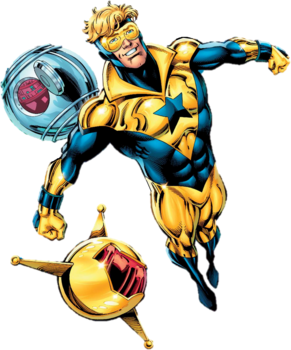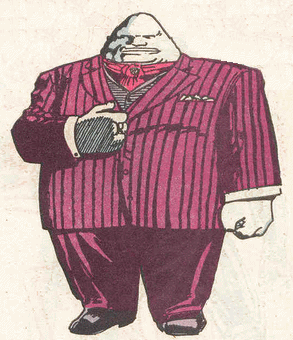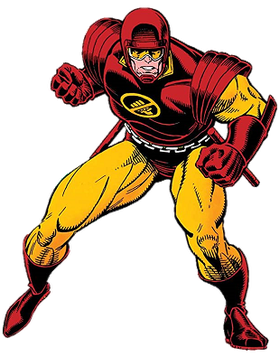
Metropolis is a fictional city appearing in American comic books published by DC Comics, best known as the home of Superman and his closest allies and some of his foes. First appearing by name in Action Comics #16, Metropolis is depicted as a prosperous and massive city in the Northeastern United States, in close proximity to Gotham City. In recent years, it has been stated to be located in New York.

Booster Gold is a superhero appearing in American comic books published by DC Comics. Created by Dan Jurgens, the character first appeared in Booster Gold #1 and has been a member of the Justice League.
The Legion of Super-Villains is a team of supervillains who appear in comic books published by DC Comics, primarily as enemies of the Legion of Super-Heroes. They first appeared in Superman #147.

Black Lightning is a superhero who appears in American comic book published by DC Comics. The character, created by writer Tony Isabella with artist Trevor Von Eeden, first appeared in Black Lightning #1, during the Bronze Age of Comic Books. Although his precise origin story has varied over the years, he is generally depicted as a metahuman superhero who uses the ability to generate and control electricity to defend his community – and the world – as Black Lightning. Although not the first black superhero to be featured in DC Comics stories, Black Lightning was DC's first African-American superhero to headline his own series.

Intergang is a fictional organized crime syndicate appearing in American comic books published by DC Comics. Armed with technology supplied by the villainous New Gods of the planet Apokolips, they consistently appear as enemies of Superman.

52 is a weekly American comic book limited series published by DC Comics that debuted on May 10, 2006, one week after the conclusion of the Infinite Crisis miniseries. The series was written by Geoff Johns, Grant Morrison, Greg Rucka, and Mark Waid, with layouts by Keith Giffen. 52 also led into a few limited series spin-offs.
The Tattooed Man is the name of three characters appearing in media published by DC Comics, primarily as an enemy of Green Lantern.

Steel is a superhero appearing in comic books published by DC Comics. He is a genius engineer who built a mechanized suit of armor that mirrors Superman's powers, and initially sought to replace him after he was killed by Doomsday. After Superman was resurrected, he accepted Steel as an ally. His real name is John Henry Irons and he wields a sledgehammer—this is a reference to the mythical railroad worker John Henry. He has a niece named Natasha Irons who is also a superhero in a similar mechanized suit of armour.

Tobias Whale is a supervillain appearing in American comic books published by DC Comics. He is the archenemy of Black Lightning.

Deadline is a fictional villain in the DC Comics universe. He first appears in the story "Deadline Doom!" in Starman #15 and was created by Roger Stern.

Bruno "Ugly" Mannheim is a supervillain appearing American comic books published by DC Comics. He is an Intergang crime boss who is the son of Moxie Mannheim and one of Superman's enemies.

Gangbuster is a comic book fictional character, a DC Comics superhero. He first appeared as Jose Delgado in The Adventures of Superman #428, and as Gangbuster in The Adventures of Superman #434. He was created by Marv Wolfman and Jerry Ordway.

Gotham Underground is a nine-issue limited series from DC Comics, written by Frank Tieri, with art by Jim Califiore.

"Convergence" is a comic book storyline published by DC Comics that ran from April to May 2015. The series consists of an eponymous #0 issue, an eight-issue core miniseries, and 40 two-issue tie-in miniseries. "Convergence" continues from the weekly series Earth 2: World's End and The New 52: Futures End. In the story, Brainiac collects cities and inhabitants from various timelines that have ended and traps them in domes on a planet outside of time and space. He then exposes the domes to one another to see how the characters interact. This event marks the return of DC characters and timelines from before the 2011 "Flashpoint" storyline that led to the creation of The New 52 Universe.












